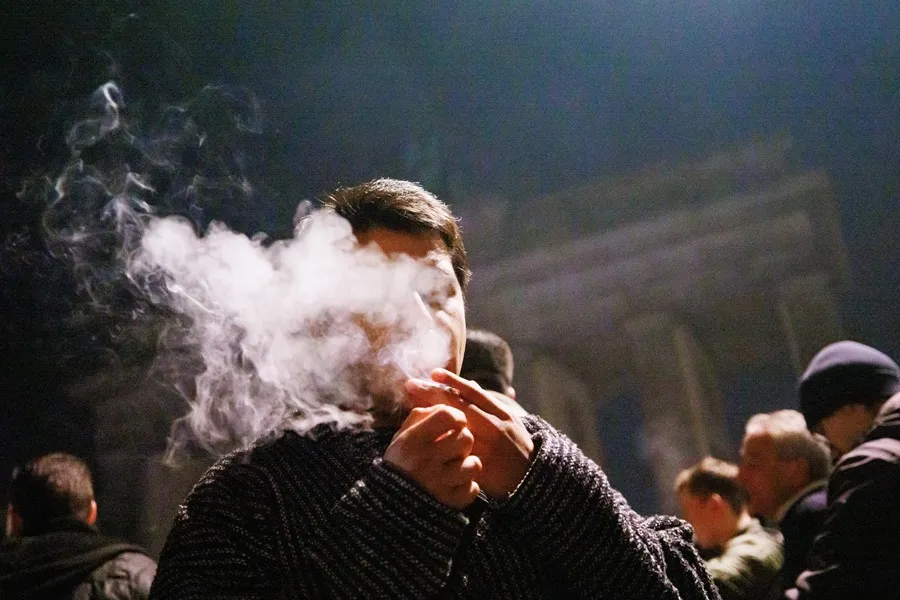International
Germany launches the partial legalization of cannabis between celebrations and criticism

The law that partially legalizes the use and recreational consumption of cannabis in Germany entered into force today after difficult debates within the political, police and health, which hundreds of people took advantage of to meet in Berlin and celebrate – smoking marijuana – the measure, criticized by some doctors and part of the opposition.
About 1,500 Berliners gathered around midnight in front of the Brandenburg Gate along with a one-meter-high model of a hemp leaf and posters on which you could read slots such as “precaution, smokers” or “we don’t want to be criminals.”
More actions of this type are expected this Easter Monday in other places throughout the country.
“I think the legalization of cannabis is right and arrives late. In my opinion, it is important to allow the use of cannabis, especially if its effects are compared with those of alcohol consumption. I also hope that decriminalization will reduce the desire for consumption among young people,” Christian, a native of Hamburg, told EFE.
From today, people over 18 years of age will be able to grow a maximum of three cannabis plants at home for self-consumption or have 50 grams of dried flowers in their private space. 25 grams will be allowed in the public space.
Smoking is prohibited in playgrounds, schools, sports facilities, including soccer stadiums, and facilities for children and young people, and in sight of them. It will also not be possible to consume cannabis between 7:00 a.m. and 8:00 p.m. in pedestrian areas.
From July 1, it will be legal to create clubs with up to 500 members who will be able to grow cannabis collectively and non-commercially and exchange it between them for private consumption.
Distribution and sale are still prohibited, as is driving a motor vehicle under the influence of the drug.
There is no legal limit for cannabis behind the wheel as with alcohol. Given the legal vacuum, a commission of experts proposed a maximum concentration of 3.5 nanograms per milliliter of blood serum for the active ingredient THC.
Anyone who exceeds the grams allowed for personal use faces penalties of up to 30,000 euros or in the worst case prison sentences.
From the perspective of those who oppose legalization, the limit of cannabis possession allowed by law is too high.
The German Medical Association considers that 50 grams per month “corresponds to high-risk consumption and leads to cannabis-related disorders.”
The Ministry of Health argues that legal cannabis must also be available in larger quantities if the illegal black market is to be undermined.
The Minister of Justice, Marco Buschmann, also argues that the legalization will ease the pressure on justice and the police in the medium term. Currently, more than 100,000 criminal proceedings are open against cannabis users.
The road to the partial legalization of cannabis was not easy in the Central European country, where the main opposition party, the conservative Christian Democratic Union (CDU), has already said that it will reverse the law if it reaches the Government.
The measure, proposed by the Minister of Health, Karl Lauterbach, in April of last year, obtained – in a strongly modified version – on February 23 the approval of the Lower House, with the vote in favor of the government coalition of social democrats, greens and liberals, as well as the left.
But the measure was about to derail in the Upper House, in which the governments of the 16 federal states are represented and where several of them had shown their opposition.
A commitment offered by Lauterbach at the last minute to regularly introduce controls in cannabis clubs and the promise of federal support for prevention measures made it possible to carry out the measure on March 22.
Meanwhile, the Government Commissioner for Drugs and Drug Addiction, Burkhard Blienert, has already asked that a decision now also be made on the pilot projects for the cannabis trade.
“It’s the only way to ensure that occasional consumers don’t have to go to camels either,” he says.
Initially the Government also wanted to allow the sale of cannabis in stores with a state license, but it ruled out the idea after the concerns expressed by the European Commission
International
Claudia Sheinbaum: Operation Against ‘El Mencho’ Was Based on Pending Arrest Warrants

Mexico’s President Claudia Sheinbaum on Wednesday rejected claims that the military operation that resulted in the death of Nemesio Oseguera Cervantes, known as “El Mencho,” leader of the Jalisco New Generation Cartel (CJNG), was carried out under pressure from the United States government.
Sheinbaum explained that the deployment of federal forces was aimed at executing outstanding arrest warrants against Oseguera Cervantes, who was considered one of the most wanted criminals in both Mexico and the United States.
“That was not the objective (to ease pressure from the United States). It is very important, and I want to repeat it. This individual had an arrest warrant, or several,” Sheinbaum said, referring to the operation conducted on February 22.
According to the president, the initial goal was to capture Oseguera Cervantes, but military forces responded after coming under attack during the intervention.
“The operation was to detain him. The problem is that they were attacked — the Secretariat of National Defense — and they responded at that moment,” she said.
The president insisted that the action was not carried out in response to external demands, although she acknowledged intelligence cooperation with the United States.
“It was not done in any way because of pressure from the United States, not at all. Of course, there was intelligence information from the United States that was used specifically,” she concluded.
International
Spain Denies Any Agreement to Cooperate with U.S. Military in Iran Operations
International
White House Says Spain Agrees to Cooperate with U.S. Military After Trump Threatens Trade Embargo

White House Press Secretary Karoline Leavitt said Wednesday that Spain has agreed “in recent hours” to cooperate with the U.S. military, following President Donald Trump’s threat to impose a trade embargo on Madrid.
Trump had warned of potential commercial measures after Spain reportedly refused to allow the Pentagon to use facilities at Spanish military bases for operations related to Iran.
“With respect to Spain, I think you heard the president’s message yesterday loud and clear, and I understand that in recent hours they have agreed to cooperate with the United States military,” Leavitt said during a press briefing.
She added that the U.S. military is currently coordinating with its counterparts in Spain. However, the president expects broader support.
“The president expects that all of Europe, all of our European allies, of course, will cooperate in this important mission — not only for the United States, but also for Europe,” Leavitt said.
Her remarks came in response to questions about Spain’s position and its role as a U.S. ally amid rising tensions surrounding operations involving Iran.
-

 International4 days ago
International4 days agoIran Reports 201 Dead, 747 Injured After U.S. and Israeli Strikes
-

 International3 days ago
International3 days agoBrazil’s Supreme Court Rejects Bolsonaro’s Bid for House Arrest
-

 International3 days ago
International3 days agoAnti-ICE Billboard Campaign Targets Immigration Spending in 31 U.S. Cities
-

 International2 days ago
International2 days agoSpain’s Prime Minister to Address Nation Amid Trump’s Trade Threats
-

 International4 days ago
International4 days agoPope Leo XIV Urges End to ‘Spiral of Violence’ in Middle East
-

 International1 day ago
International1 day agoWhite House Says Spain Agrees to Cooperate with U.S. Military After Trump Threatens Trade Embargo
-

 International3 days ago
International3 days agoTrump Warns of ‘Major Wave’ of Attacks as Iran Conflict Escalates
-

 International3 days ago
International3 days agoMexico Calls for Immediate Probe After National Dies in ICE Custody
-

 International2 days ago
International2 days agoNew York Announces First 2,000 Seats in Universal 2-K Program
-

 International1 day ago
International1 day agoSpain Denies Any Agreement to Cooperate with U.S. Military in Iran Operations
-

 Central America2 days ago
Central America2 days agoGuatemala’s Attorney General Fails in Bid for Top Court Seat Amid Corruption Allegations
-

 Central America1 day ago
Central America1 day agoNicaragua Held Responsible for Harassment of Opposition Prosecutor and His Family
-

 Central America3 days ago
Central America3 days agoPanama Canal Monitoring Trade as Middle East Conflict Disrupts Shipping
-

 International3 days ago
International3 days agoBolivia Orders Three Investigations Into Deadly Military Plane Crash
-

 International2 days ago
International2 days agoWarner Bros. Developing First ‘Game of Thrones’ Movie With ‘Andor’ Writer
-

 International1 day ago
International1 day agoClaudia Sheinbaum: Operation Against ‘El Mencho’ Was Based on Pending Arrest Warrants

































